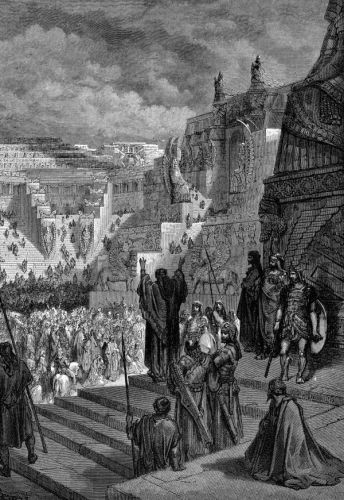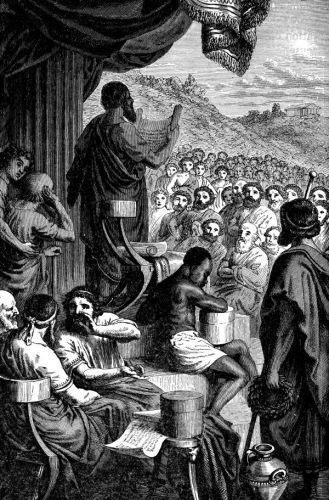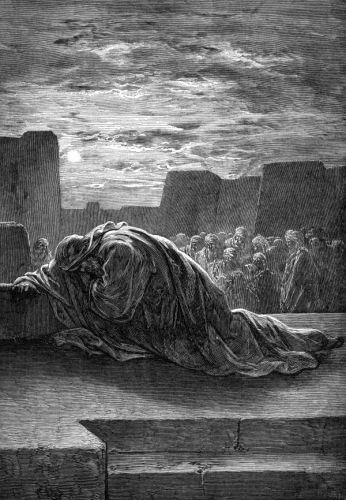Thoughts on Ezra
Although Ezra and Nehemiah are written about the same time, different events tell a different spiritual lesson. I was thinking about Ezra, a book we studied as a group some time ago. One deals with rebuilding the temple, the other the wall. Many people look at the rebuilding of the temple without ever considering the story of Ezra as a whole. They think because it was fulfilling prophecy it must have been a good thing. Looking at the details tells another spiritual lesson.
 Ezra 3:3 NLTse Even though the people were afraid of the local residents, they rebuilt the altar at its old site. Then they began to sacrifice burnt offerings on the altar to the LORD each morning and evening.
Ezra 3:3 NLTse Even though the people were afraid of the local residents, they rebuilt the altar at its old site. Then they began to sacrifice burnt offerings on the altar to the LORD each morning and evening.
On the surface this may seem to be a good thing, but was it? Which alter did they rebuild? A previous king of Jerusalem tore down the original alter replacing it with a pagan design.
2 Kings 16:10-12 NLTse King Ahaz then went to Damascus to meet with King Tiglath-pileser of Assyria. While he was there, he took special note of the altar. Then he sent a model of the altar to Uriah the priest, along with its design in full detail. (11) Uriah followed the king’s instructions and built an altar just like it, and it was ready before the king returned from Damascus. (12) When the king returned, he inspected the altar and made offerings on it.
God knew this was going to happen. That is why He gave Moses specific orders concerning the altar.
Exodus 20:26 NLTse And do not approach my altar by going up steps. If you do, someone might look up under your clothing and see your nakedness.
Many theologians think the altar patterned from Damascus would have steps leading up to the platform.
The book of Ezra teaches an important lesson. Ezra had a heart that only wanted to follow God and do the right thing. But, he was constantly influenced by people who thought they had a better idea. As long as it appeared they were serving God, they could do no wrong. Here is a short run down of the sequence.
Ezra 7:26-27 NLTse Anyone who refuses to obey the law of your God and the law of the king will be punished immediately, either by death, banishment, confiscation of goods, or imprisonment.” (27) Praise the LORD, the God of our ancestors, who made the king want to beautify the Temple of the LORD in Jerusalem!
The problem began in Babylon when King Artaxerxes told Ezra to return to Jerusalem to rebuild the temple. Does forcing religion on people ever show the benefits of serving God? What spiritual lessons do we learn from this? Notice where this took place.
The sequence continues after Ezra’s prayer to God.
Ezra 10:1-5 NLTse While Ezra prayed and made this confession, weeping and lying face down on the ground in front of the Temple of God, a very large crowd of people from Israel–men, women, and children–gathered and wept bitterly with him. (2) Then Shecaniah son of Jehiel, a descendant of Elam, said to Ezra, “We have been unfaithful to our God, for we have married these pagan women of the land. But in spite of this there is hope for Israel. (3) Let us now make a covenant with our God to divorce our pagan wives and to send them away with their children. We will follow the advice given by you and by the others who respect the commands of our God. Let it be done according to the Law of God. (4) Get up, for it is your duty to tell us how to proceed in setting things straight. We are behind you, so be strong and take action.” (5) So Ezra stood up and demanded that the leaders of the priests and the Levites and all the people of Israel swear that they would do as Shecaniah had said. And they all swore a solemn oath.
Did you notice one very important missing detail? Ezra did not receive an answer from God. Shecaniah stepped in and offered his own idea of how to handle the situation. Instead of finishing his prayer and waiting for God’s answer. Ezra takes Shecaniah’s advice. Do we still see that happening today? Notice how the Bible points out, “swear that they would do as Shecaniah had said.” What happened to God in this picture? Paul repeated the same mistake when he returned to Jerusalem even though he was instructed not to. Some of the other disciples convinced Paul to offer a sacrifice in the temple to calm down the Jewish believers. Instead of solving the problem, it created a whole new problem for Paul.
I wanted to point this out because I have seen people taking out bits and pieces of Ezra to justify divorce and go way beyond. They side with one party and condemn the other. The church uses bits and pieces of Ezra to make the same mistake he made. They do not finish their prayer to God, but rely on the advice of other people to judge others. They think they are being Christians by accepting one party in a divorce while using Ezra to condemn the other. They didn’t stop there.
Ezra 10:7-8 NLTse Then a proclamation was made throughout Judah and Jerusalem that all the exiles should come to Jerusalem. (8) Those who failed to come within three days would, if the leaders and elders so decided, forfeit all their property and be expelled from the assembly of the exiles.
Once they think they have the authority to make decisions it grows like a cancer. First the marriage then the property. Is this what God wanted? No! God never creates new ways of dividing His people. As long as the majority think the decision benefits them, they are more than happy to give all the authority to their leaders.
 Ezra 10:14 NLTse Let our leaders act on behalf of us all. Let everyone who has a pagan wife come at a scheduled time, accompanied by the leaders and judges of his city, so that the fierce anger of our God concerning this affair may be turned away from us.”
Ezra 10:14 NLTse Let our leaders act on behalf of us all. Let everyone who has a pagan wife come at a scheduled time, accompanied by the leaders and judges of his city, so that the fierce anger of our God concerning this affair may be turned away from us.”
Of course people also point to Ezra as proof of a God led remnant. But were they? Look at all the parallels between Ezra and the complaining done on the way from Egypt to the promised land. Both groups had only a few people who looked at the way the majority was acting and stood on their own beliefs.
Ezra 10:15 NLTse Only Jonathan son of Asahel and Jahzeiah son of Tikvah opposed this course of action, and they were supported by Meshullam and Shabbethai the Levite.
Once you see how Ezra, a faithful man fell into the trap of following the crowd all the pieces begin to fall into place. You can see why Jesus’ disciples had such a difficult time to put away popular beliefs and understand what Jesus was teaching. Remember how Jesus taught all those lessons in the temple court. When they left the minds of the disciples were still stuck on the grandness of the temple structure. They missed the point Jesus was trying to teach. The disciples still wanted to be like the religious leaders. Imagine Jesus’ followers wanting to model themselves after the people who were about to kill their teacher.
